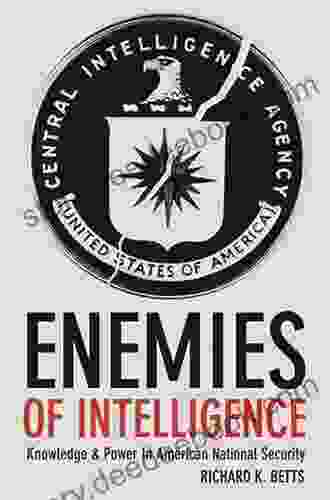Knowledge and Power in American National Security

The United States has long been a global superpower, and its national security has been a top priority. In recent years, there has been a growing debate about the role of knowledge in national security. Some argue that knowledge is essential for effective national security, while others argue that it can also be a source of vulnerability.
There are a number of reasons why knowledge is important for national security. First, knowledge can help us to understand the threats that we face. By understanding the capabilities and intentions of our adversaries, we can better prepare to defend ourselves. Second, knowledge can help us to develop new and innovative ways to protect ourselves. By researching new technologies and strategies, we can stay ahead of our adversaries and maintain our competitive edge.
4.4 out of 5
| Language | : | English |
| File size | : | 1100 KB |
| Text-to-Speech | : | Enabled |
| Enhanced typesetting | : | Enabled |
| Word Wise | : | Enabled |
| Print length | : | 266 pages |
| Screen Reader | : | Supported |
However, there are also some risks associated with knowledge. First, knowledge can be a source of vulnerability. If our adversaries learn too much about our capabilities and intentions, they may be able to exploit them. Second, knowledge can be used to justify aggression. By claiming that our adversaries have a certain capability or intention, we may be able to justify taking preemptive action against them.
The debate about the role of knowledge in national security is likely to continue for many years to come. There are no easy answers, and the best approach will vary depending on the specific circumstances. However, it is important to be aware of the risks and benefits of knowledge, so that we can make informed decisions about how to use it.
The Role of Knowledge in Intelligence Gathering
Intelligence gathering is a critical part of national security. It allows us to collect information about our adversaries, their capabilities, and their intentions. This information can then be used to develop strategies to protect ourselves from threats.
There are a variety of ways to gather intelligence. Some of the most common methods include:
- Human intelligence (HUMINT): This involves using human agents to collect information. HUMINT agents may be recruited from a variety of sources, including the military, law enforcement, and academia.
- Signals intelligence (SIGINT): This involves intercepting and analyzing electronic communications. SIGINT can be used to collect a wide range of information, including phone calls, emails, and text messages.
- Imagery intelligence (IMINT): This involves using satellites and other sensors to collect images of the Earth's surface. IMINT can be used to identify and track targets, as well as to assess damage.
The intelligence that is collected is then analyzed by intelligence analysts. These analysts use a variety of techniques to identify patterns and trends, and to assess the credibility of the information. The intelligence that is produced by analysts is then used by policymakers to make decisions about how to protect the United States from threats.
The Role of Knowledge in Military Operations
Knowledge is also essential for military operations. By understanding the terrain, the enemy, and the weather, military commanders can better plan and execute their operations. Knowledge can also help to reduce the risk of casualties and to increase the chances of success.
There are a number of ways that knowledge can be used in military operations. Some of the most common methods include:
- Terrain analysis: This involves studying the terrain in which military operations will be conducted. Terrain analysis can help to identify obstacles, choke points, and other features that may affect the course of battle.
- Enemy analysis: This involves studying the enemy's capabilities, intentions, and weaknesses. Enemy analysis can help to identify the enemy's strengths and vulnerabilities, and to develop strategies to exploit them.
- Weather analysis: This involves studying the weather in the area where military operations will be conducted. Weather analysis can help to identify potential hazards, such as storms and fog, and to adjust plans accordingly.
The knowledge that is collected is then used by military commanders to make decisions about how to conduct their operations. By understanding the terrain, the enemy, and the weather, commanders can better plan and execute their operations, and reduce the risk of casualties.
The Role of Knowledge in Cybersecurity
Cybersecurity is a growing concern for the United States. As our dependence on computers and networks increases, so too does the risk of cyberattacks. Cyberattacks can disrupt critical infrastructure, steal sensitive information, and even cause physical damage.
Knowledge is essential for cybersecurity. By understanding the threats that we face, we can better protect ourselves from them. There are a number of ways that knowledge can be used to improve cybersecurity. Some of the most common methods include:
- Threat intelligence: This involves collecting and analyzing information about cyber threats. Threat intelligence can help to identify new threats, assess the risk of existing threats, and develop strategies to mitigate them.
- Vulnerability assessment: This involves identifying and assessing the vulnerabilities in computer systems and networks. Vulnerability assessments can help to identify potential weaknesses that could be exploited by attackers.
- Security awareness training: This involves educating users about cybersecurity risks and how to protect themselves from them. Security awareness training can help to reduce the risk of human error, which is a common cause of cyberattacks.
The knowledge that is collected is then used by cybersecurity professionals to develop and implement security measures. By understanding the threats that we face and the vulnerabilities in our systems, we can better protect ourselves from cyberattacks.
Knowledge is essential for national security. It helps us to understand the threats that we face, to develop new and innovative ways to protect ourselves, and to make informed decisions about how to use our resources. The debate about the role of knowledge in national security is likely to continue for many years to come. However, it is important to be aware of the risks and benefits of knowledge, so that we can make informed decisions about how to use it.
4.4 out of 5
| Language | : | English |
| File size | : | 1100 KB |
| Text-to-Speech | : | Enabled |
| Enhanced typesetting | : | Enabled |
| Word Wise | : | Enabled |
| Print length | : | 266 pages |
| Screen Reader | : | Supported |
Do you want to contribute by writing guest posts on this blog?
Please contact us and send us a resume of previous articles that you have written.
 Novel
Novel Page
Page Genre
Genre Library
Library E-book
E-book Magazine
Magazine Newspaper
Newspaper Paragraph
Paragraph Shelf
Shelf Glossary
Glossary Preface
Preface Bestseller
Bestseller Library card
Library card Biography
Biography Autobiography
Autobiography Reference
Reference Encyclopedia
Encyclopedia Dictionary
Dictionary Narrator
Narrator Resolution
Resolution Librarian
Librarian Catalog
Catalog Card Catalog
Card Catalog Stacks
Stacks Archives
Archives Study
Study Lending
Lending Journals
Journals Reading Room
Reading Room Rare Books
Rare Books Special Collections
Special Collections Interlibrary
Interlibrary Literacy
Literacy Study Group
Study Group Thesis
Thesis Dissertation
Dissertation Reading List
Reading List Book Club
Book Club Theory
Theory Textbooks
Textbooks Karen Petry
Karen Petry J Lucy Boyd
J Lucy Boyd Mike Twohy
Mike Twohy Mary Ellen Allison
Mary Ellen Allison Bob St John
Bob St John Chris Welles Feder
Chris Welles Feder Irene Noguer
Irene Noguer Valerie Keogh
Valerie Keogh Ted Simon
Ted Simon Steven Dos Santos
Steven Dos Santos L A Vocelle
L A Vocelle Burton D Fisher
Burton D Fisher H G Wells
H G Wells Jahquel J
Jahquel J Charles Martin
Charles Martin Tom Demichael
Tom Demichael Lane Smith
Lane Smith Suzanne Morris
Suzanne Morris Sarah Mcdugal
Sarah Mcdugal Jeff Zycinski
Jeff Zycinski
Light bulbAdvertise smarter! Our strategic ad space ensures maximum exposure. Reserve your spot today!

 Roberto BolañoFun Designs for Your Feet: Clogs, Moccasins, Boots, Animal Slippers, Loafers,...
Roberto BolañoFun Designs for Your Feet: Clogs, Moccasins, Boots, Animal Slippers, Loafers,... Federico García LorcaFollow ·13.2k
Federico García LorcaFollow ·13.2k Thomas PowellFollow ·4.5k
Thomas PowellFollow ·4.5k Gerald BellFollow ·8.8k
Gerald BellFollow ·8.8k Andrew BellFollow ·15k
Andrew BellFollow ·15k Josh CarterFollow ·16.9k
Josh CarterFollow ·16.9k Yukio MishimaFollow ·19.2k
Yukio MishimaFollow ·19.2k Carlos FuentesFollow ·5k
Carlos FuentesFollow ·5k Leo TolstoyFollow ·12.3k
Leo TolstoyFollow ·12.3k

 Matt Reed
Matt ReedTrekking the Breathtaking Scotland Coast to Coast Trail:...
Lace up your...

 Deacon Bell
Deacon BellThe Easy Guide to Playing Piano Scales: Piano Lessons for...
Piano scales...

 Fred Foster
Fred FosterUnveiling the Enthralling Best Friends to Lovers Romance...
Westbury Warriors: Where Love...

 T.S. Eliot
T.S. EliotHow To Dramatically Increase Your Profits And Sales...
Are you looking...

 Aaron Brooks
Aaron BrooksSummer at Stallion Ridge by Delores Fossen: A Thrilling...
Immerse Yourself in the...
4.4 out of 5
| Language | : | English |
| File size | : | 1100 KB |
| Text-to-Speech | : | Enabled |
| Enhanced typesetting | : | Enabled |
| Word Wise | : | Enabled |
| Print length | : | 266 pages |
| Screen Reader | : | Supported |












